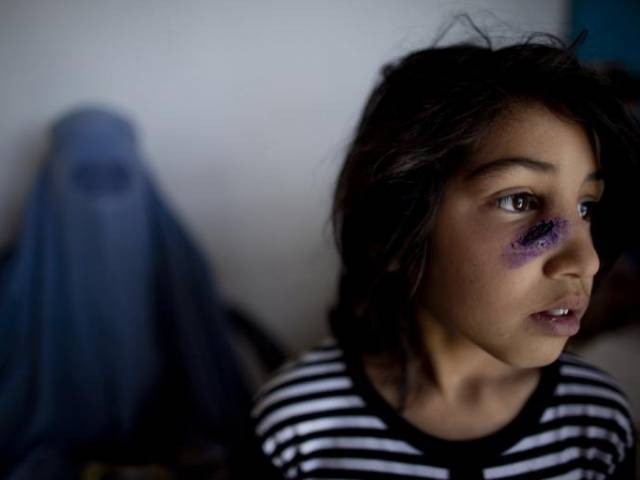Leishmaniasis outbreak: K-P reports 1,447 cases
Health dept strains under case weight as it struggles to secure medicine registration

The report told the chief minister that most of the cases from K-P were that of coetaneous Leishmaniasis.
PHOTO: AFP
With most of the vaccine stocks already exhausted in treating patients in the former tribal agency, the Khyber-Pakhtunkhwa (K-P) health department has been facing a challenge in securing additional doses including registration of new medicines with the Drug Regulatory Authority of Pakistan (DRAP) and permission to manufacture drugs locally.
Moreover, it has been facing a shortage of medicines, underreporting of cases and unavailability of entomologist for vector surveillance.
These shocking revelations were detailed in a report submitted by the health department to the K-P Caretaker Chief Minister Justice (retd) Dost Muhammad Khan after the latter took notice of the Leishmaniasis cases in different parts of the province.
Leishmania outbreak in Mohmand
According to the report submitted last week, as many as 135 patients had been registered until Saturday and it was being termed as good progress for the newly established Leishmaniasis health centre.
On May 10, the provincial government had inaugurated the first modern centre of the province to treat Leishmaniasis patients in Naseerullah Babar Hospital in Peshawar, commonly known as City Hospital.
Located on Kohat road, the centre had been set up in collaboration with Doctors Without Borders (MSF).
The report stated that most of the patients being treated there hailed from Peshawar; however, there was a trickle of patients from other districts as well, particularly from the tribal areas.
Very soon the centre will be a focus of referral for the entire province, read the report, a copy of which is available with The Express Tribune.
“At the moment the registered patients are from Peshawar, Khyber, Kohat, Nowshera, Charsadda, Mardan, Karak, Mohmand and Bajaur,” the report read adding, “Not only patients from K-P but from neighbouring Afghanistan have also been extended full support and medication against the disease.”
‘Kidney diseases eighth biggest killers of women'
The report told the chief minister that most of the cases from K-P were that of coetaneous Leishmaniasis.
It added that the number of cases had surpassed those of last year, adding that as many as 1,700 have been reported in the year, but the list was available for only 1,447 cases.
“However, it has been observed that the disease is under-reported,” the report read, adding, “the major challenge is that the medicine which is the drug of choice is not registered in Pakistan hence is not available and the department has requested the World Health Organisation (WHO) time and again to import the medicine for the purpose.”
It stated that the WHO has supported the department and provided significant quantities of the vaccine to treat cases in the province.
It added that the provincial health department has already declared Leishmaniasis as a notifiable disease under the Public Health Act and guidelines for prevention and control of Leishmaniasis have been distributed.
“DRAP has been requested to register the relevant drugs and the WHO was requested to provide the drugs. The medicine was provided as requested but the quantity is not sufficient for treatment of all cases,” the report revealed adding that the drugs were distributed among districts as per requirement.
There have been sporadic cases of Leishmaniasis throughout the province with recent outbreaks in Karak, Bannu, Charsadda, Mardan, Shangla and some other districts but the sand fly, which causes Leishmaniasis, is found in almost all districts and throughout the year.
The report shared with the chief minister read that all necessary measures were being taken, yet hundreds of cases go unnoticed owing to poor reporting. Moreover, lack of surveillance systems and frequency of disease in remote areas and amongst marginalised populations means that it was difficult to estimate the true scale of Leishmaniasis and the case-fatality of visceral Leishmaniasis.
“The situation is further aggravated due to poor coordination between the physicians, both private and public-sector physicians, and the district health office,” the report revealed adding, “There has always been prompt response by the district and provincial programmes including team assignments, camp activity, routine medicine and above all distribution of the much-needed injection glucantine as treatment of the disease.”
Reports from districts are accumulated at the provincial level and comprehensive district wise line-list of Leishmaniasis cases is prepared both for response and follow-ups, it informed adding K-P vector control programme and public health sections respond to outbreaks in coordination with the district health management team and District Headquarter Hospital (DHQ – Dermatology and medical sections).
Published in The Express Tribune, June 25th, 2018.













COMMENTS
Comments are moderated and generally will be posted if they are on-topic and not abusive.
For more information, please see our Comments FAQ